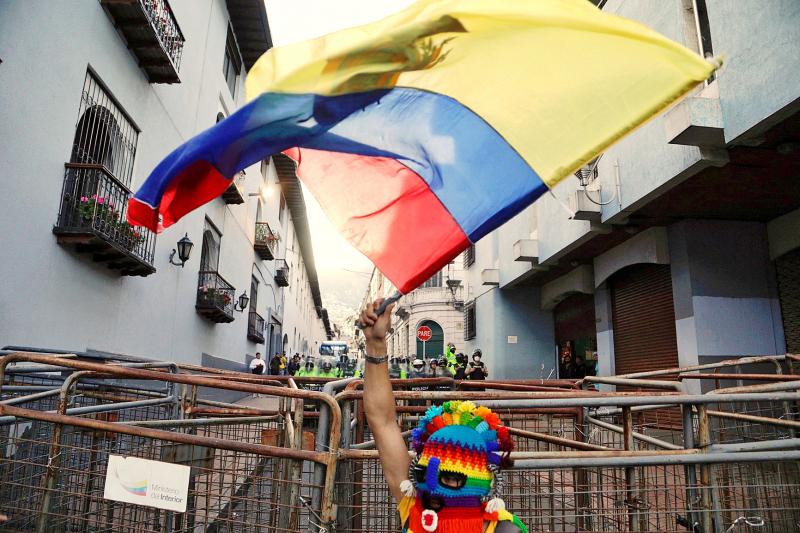Ecuador’s state-owned oil company Petroecuador late on Saturday declared force majeure over the impact of protests against the government’s social and economic policies in the Andean country, while President Guillermo Lasso tried to clamp down on unrest.
The oil company declared force majeure for its exploration, exploitation, transport and commerce sectors — halting exports — after protesters entered oil fields, affecting output, it said in a statement.
The move followed Lasso’s decision to declare a state of exception in three provinces late on Friday, in a bid to calm protests called by indigenous groups rejecting of the government’s economic policies.

Photo: AFP
The state of exception is to last for 30 days in the provinces of Imbabura, Cotopaxi, and Pichincha — areas that include the capital, Quito — which have seen greater violence amid protests, with attacks on flower farms and damage to infrastructure, while police officers have also been detained by protesters.
Curfews in Quito are to run from 10pm until 5am from Saturday, Lasso said late on Friday, while gatherings would be banned all day in the affected provinces. He did not say how long the measures would last.
“I called for dialogue and the answer was more violence, there is no intention to find solutions,” Lasso said in a televised broadcast.
Indigenous groups launched protests on Monday last week, with demonstrators blocking roads across the country in opposition to Lasso’s social and economic policies, demanding gasoline price freezes, a halt to further mining and oil projects, and more time for small farmers to pay their bank loans.
Petroecuador said it has lost 6,975 barrels of crude since protests started and has halted some drilling operations.
Lasso is to increase help for the most vulnerable sectors and would subsidize fertilizer costs by 50 percent for small and medium farmers, while the public bank would forgive overdue loans worth up to US$3,000.
There will be no increase in the costs of diesel, gasoline, and gas, Lasso added.
Indigenous groups continue to block roads connecting Quito with the north and south of the country, while students have supported the protests.
Leonidas Iza, president of Ecuador’s CONAIE indigenous organization, said on social media that Lasso’s proposals would partially resolve the issues, but he doubted they would be implemented.
“From this moment we are preparing to mobilize and reject these policies in Quito,” he said.
The protests have cost the country’s productive sector US$50 million and led to shortages in certain products and fuels.

A new online voting system aimed at boosting turnout among the Philippines’ millions of overseas workers ahead of Monday’s mid-term elections has been marked by confusion and fears of disenfranchisement. Thousands of overseas Filipino workers have already cast their ballots in the race dominated by a bitter feud between President Ferdinand Marcos Jr and his impeached vice president, Sara Duterte. While official turnout figures are not yet publicly available, data from the Philippine Commission on Elections (COMELEC) showed that at least 134,000 of the 1.22 million registered overseas voters have signed up for the new online system, which opened on April 13. However,

ALLIES: Calling Putin his ‘old friend,’ Xi said Beijing stood alongside Russia ‘in the face of the international counter-current of unilateralism and hegemonic bullying’ Chinese President Xi Jinping (習近平) yesterday was in Moscow for a state visit ahead of the Kremlin’s grand Victory Day celebrations, as Ukraine accused Russia’s army of launching air strikes just hours into a supposed truce. More than 20 foreign leaders were in Russia to attend a vast military parade today marking 80 years since the defeat of Nazi Germany in World War II, taking place three years into Russia’s offensive in Ukraine. Putin ordered troops into Ukraine in February 2022 and has marshaled the memory of Soviet victory against Nazi Germany to justify his campaign and rally society behind the offensive,

ENTERTAINMENT: Rio officials have a history of organizing massive concerts on Copacabana Beach, with Madonna’s show drawing about 1.6 million fans last year Lady Gaga on Saturday night gave a free concert in front of 2 million fans who poured onto Copacabana Beach in Rio de Janeiro for the biggest show of her career. “Tonight, we’re making history... Thank you for making history with me,” Lady Gaga told a screaming crowd. The Mother Monster, as she is known, started the show at about 10:10pm local time with her 2011 song Bloody Mary. Cries of joy rose from the tightly packed fans who sang and danced shoulder-to-shoulder on the vast stretch of sand. Concert organizers said 2.1 million people attended the show. Lady Gaga

CONFLICTING REPORTS: Beijing said it was ‘not familiar with the matter’ when asked if Chinese jets were used in the conflict, after Pakistan’s foreign minister said they were The Pakistan Army yesterday said it shot down 25 Indian drones, a day after the worst violence between the nuclear-armed rivals in two decades. Pakistani Prime Minister Shehbaz Sharif vowed to retaliate after India launched deadly missile strikes on Wednesday morning, escalating days of gunfire along their border. At least 45 deaths were reported from both sides following Wednesday’s violence, including children. Pakistan’s military said in a statement yesterday that it had “so far shot down 25 Israeli-made Harop drones” at multiple location across the country. “Last night, India showed another act of aggression by sending drones to multiple locations,” Pakistan military spokesman Ahmed